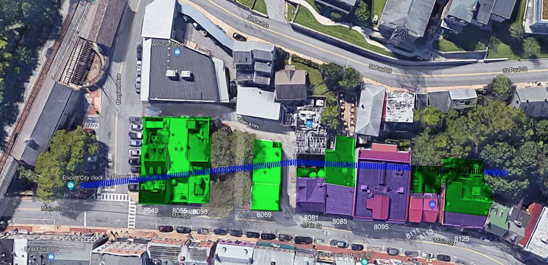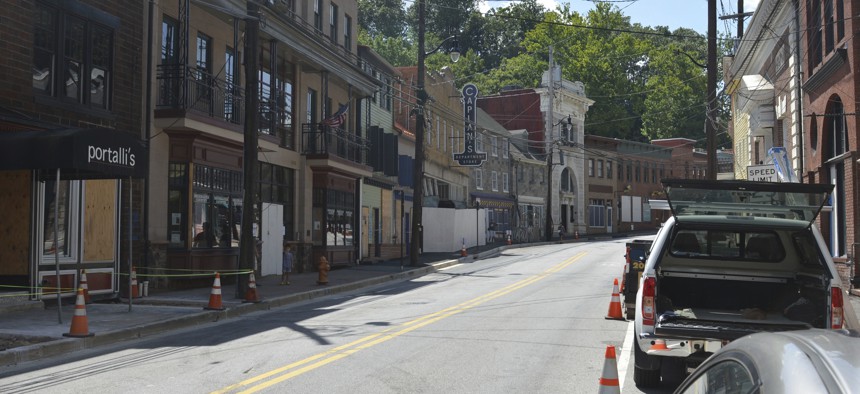Connecting state and local government leaders
After catastrophic storms in 2016 and 2018, the Maryland mill town has five flood control plans. But it faces hard choices on how to avoid future disasters.
For the past year, the fate of Ellicott City, Maryland, has been trapped in limbo. Between 2011 and 2018, three separate floods have hammered the the 247-year-old mill town outside Baltimore, first from Tropical Storm Lee and then via a lethal pair of “1,000-year storms” that sent water raging down the valley and through Main Street, killing two people in 2016 and one in 2018. The spectacular flooding, which was captured in videos shot by residents and widely shared on social media, caused tens of millions of dollars in damages and turned this sleepy pocket of suburban Howard County into an unlikely global symbol of the uncertainties and dangers that await in a warmer, wetter world.
The severity of the flooding was blamed not only on the growing intensity of climate-change-juiced rainfall events—the twin cloudbursts soaked the town in 6 and 8 inches of water within two hours in 2016 and 2018, respectively—but on housing development patterns that reshaped the area’s hydrology, increasing stormwater runoff and exacerbating the risk of catastrophic downstream inundation.
Despite the urgency, there has been little consensus among county officials, residents, and advocates about what flood mitigation could look like—or whether the town should even rebuild. Now the county is finally laying out concrete options on the table. And the message is clear—if Ellicott City is to survive, part of it must be sacrificed.
An initial plan proposed by former Howard County Executive Allan Kittleman called for demolishing 10 buildings in the town’s low-lying historic core, but that plan met with resistance from preservationists and community members, and Kittleman, a Republican, was unseated by Democrat Calvin Ball in the 2018 election. Ball halted his predecessor’s plans and promised to search for less-destructive alternatives.
In a meeting on Wednesday inside a chic home furniture store in the heart of Main Street, Ball announced his five flood mitigation options. All involve demolishing at least four buildings at the lower east end of the street; one calls for six buildings to be torn down. The room would be used for the construction of culverts to carry stormwater from nearby stream channels into the Patapsco River.

The proposals represent the second phase of Ball’s Safe and Sound initiative, which he introduced in December. The first phase included more frequent clearing of debris in streams and waterways and the introduction of a flood alert system, which will begin testing within weeks. Meanwhile, the county studied alternatives to razing 10 buildings, a move hailed by preservationists but criticized by some Main Street residents and business owners who say the priority should be public safety.
The five options would cost between $63.5 million to $175 million, and take between four and seven years to complete; they’re expected to reduce the floodwater down to between 2 to 3.6 feet on Main Street. The two most costly variations call for boring underground tunnels to divert water away from Main Street—a scheme once deemed too expensive by officials.
“Each option represents a comprehensive collection of flood mitigation projects that result in less water on Main Street than the previous plan, and put public safety above all else,” Ball said at the press conference. The county will solicit input from residents online and hold a public hearing on May 2, after which Ball will make his final decision by May 15, 12 days shy of the anniversary of the 2018 flood.
Paying for the project will be a multi-year process involving several funding streams, Ball said. Already, the county budget will include $15.3 million for flood mitigation. Another $3.4 million will come from the state capital budget, and an additional $700,000 for cleanup and façade restoration will come from the Maryland Department of Housing and Community Development.
Among preservationists, the new proposals are being met with cautious optimism. “It’s always tough to see four buildings come down, and I’ll need to better understand—as the public does—the decision-making process,” said Nicholas Redding, executive director of the nonprofit Preservation Maryland. “Then the [next] part of the conversation is what happens to the buildings? Can they be moved and disassembled? How are they treated, and then, what follows?”
Ball also promised “immediate” action to address blight on the lower end of Main Street, where several historic buildings, including those designated to be demolished, remain boarded up. “It’s been like living in a disaster area,” resident Christina Allen Page told CityLab.
“Or a war zone,” Beth Woodruff, another resident, chimed in.
Among those who will have to make the biggest sacrifice is Sally Tennant, who’s been a part of Main Street for nearly 40 years. She lost both her business and her home, which sits atop her funky craft and jewelry boutique Discoveries in one of the buildings now designated for demolition. After the 2016 flood, she spent her life savings on repairs, only to watch another deluge destroy her work a year later.
Of those four buildings, hers is the only one that the county government hasn’t acquired. She says she’s still negotiating. “I’m the only one who’s losing their home and I’m one of two losing their business locations,” she said. “I just want to get a fair appraisal and get treated fairly by the county for the damages to make me whole.”
Like many residents, Tennant believes unconstrained hillside development and poor stormwater management policies played a role in the disaster. But she says she’s largely accepted that, no matter what, her building is lost. “I don’t like it,” she said. “But if that what needs to happen there’s nothing I can do about it.”
Ball’s latest plan reveals the challenges involved in saving Ellicott City, where revenue from tourists and visitors is critical to the local economy. Flood mitigation projects take years to implement, but next storm can come any day. Meanwhile, uncertainty about the town’s future is making its economic present difficult. “The minute you get a sprinkle, this place clears out,” said Page.
Officials estimate that damage from the 2016 flood cost $42 million in lost economic activity; losses since 2018 are likely be even greater, as many business owners decide not to return a second time. At least six Main Street buildings are currently vacant and for lease, and a handful more at the lower end are still in disrepair.
While there’s a growing urgency to protect the vitality and character of Main Street now, Ball acknowledges that some things need to dramatically change. “We’re quickly approaching the first anniversary of the 2018 flood,” he said. “We need a bold innovative solution that won’t just be a Band-Aid for this town until the next storm.”
Linda Poon is a staff writer at CityLab.

NEXT STORY: Civic Crowdfunding Reduces the Risk of Bike Lane Opposition



